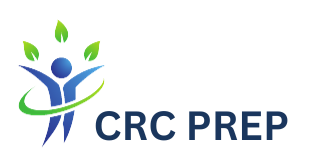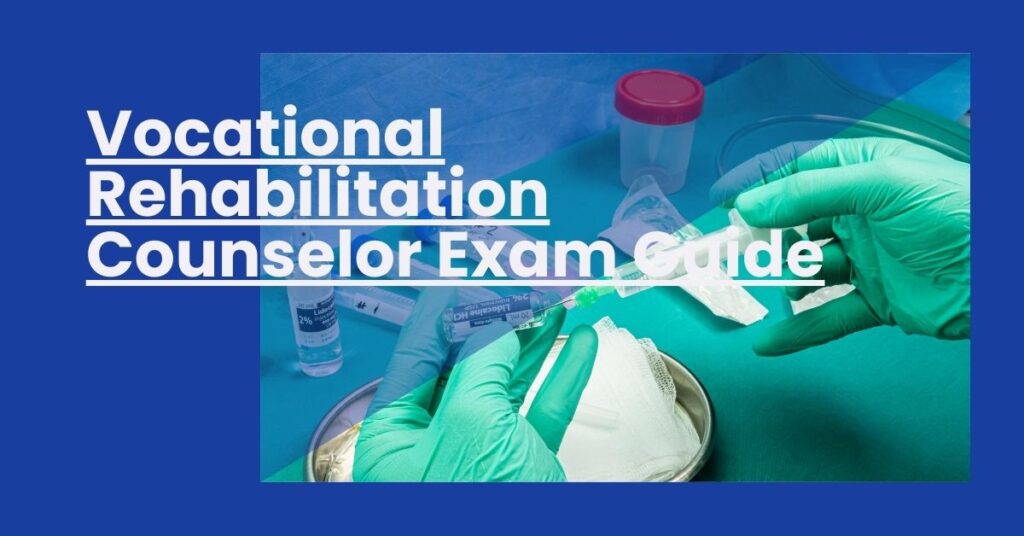Master your vocational rehabilitation counselor exam guide with confidence and ease.
- Eligibility Criteria: Clarify qualifications and application details for the vocational rehabilitation counselor exam.
- Study Resources: Discover curated study materials and strategies tailored to the exam content.
- Exam Strategies: Learn effective techniques to navigate the test successfully and manage exam day stress.
Unlock success with our vocational rehabilitation counselor exam guide.
- Understanding the Vocational Rehabilitation Counselor Exam
- Eligibility and Exam Application
- Exam Structure and Content Outline
- Study Strategies and Preparation Tips
- Reviewing Key Vocational Rehabilitation Concepts
- Practice Tests and Sample Questions
- Test-Taking Strategies
- Navigating Exam Day
- Post-Exam Steps
- Continuing Education and Career Advancement
- Conclusion: Launching Your Rehabilitation Counseling Career
Understanding the Vocational Rehabilitation Counselor Exam
As you embark on the challenging and rewarding path of becoming a vocational rehabilitation counselor, the exam you must conquer will measure your grasp of the field’s multifaceted nature. Certification is more than a milestone; it represents your commitment to supporting individuals with disabilities, enabling them to thrive in their vocational pursuits. Let’s dive into what the Vocational Rehabilitation Counselor Exam entails to help you pave the way for your successful career.
What is the Vocational Rehabilitation Counselor Exam?
The exam is a critical component in the certification process. Designed to assess whether you possess the requisite knowledge and expertise in vocational rehabilitation, it covers a spectrum of topics essential for effective practice in the field. It’s your gateway to establishing credibility and ensuring you align with nationally recognized standards.
Why is the Exam Important for Your Career?
A passing score signifies that you’re equipped with the right tools to make a meaningful difference in the lives of those you serve. It validates your specialized skills, potentially expanding your job prospects and affirming your professional dedication to this invaluable sector of healthcare and social support.
Eligibility and Exam Application
Before marking your calendar for the big day, let’s review the eligibility criteria you’ll need to satisfy to take the plunge.
Do You Qualify to Take the Exam?
You’re likely eager to step up to the challenge, so it’s crucial to ensure you meet the following requirements beforehand:
- A relevant degree or equivalent qualifications in the social services field
- Adequate professional experience that underscores your readiness for certification
- Formal application to the certifying body accompanied by the necessary documentation
Clear these hurdles, and you’ll be set to plot your course through the application process.
Navigating the Application Process
The path to the exam room involves noteworthy administrative benchmarks:
- Gathering Your Credentials: Compile your academic and professional records.
- Completing the Application: This encompasses providing your details and paying the examination fee.
- Awaiting Confirmation: Post-application, keep tabs on notification timelines to ensure no detail slips through the cracks.
Exam Structure and Content Outline
The structure of the Vocational Rehabilitation Counselor Exam might seem daunting at first glance, but a closer look reveals a systematic assessment designed to gauge diverse areas of your expertise.
Breaking Down the Exam Format
Picture this: a series of questions each woven to test a separate strand of your vocational rehabilitation counsel knowledge. The exam typically has a multiple-choice format, a calculated mix to assess both your theoretical understanding and practical application skills.
Grasping the Content Domains
Your mastery will be tested in several domains:
- Ethics and Legal Issues: The bedrock principles that govern practice.
- Assessment and Evaluation: Tools and methods to understand client needs.
- Career Counseling: Strategies for guiding clients toward employment goals.
- Case Management: Your approach to organizing and coordinating services.
Understanding the breadth and depth of these areas is your map to success.
Study Strategies and Preparation Tips
Turning the wealth of information into digestible, retainable knowledge requires a tactical approach. Here’s how to channel your study prowess for maximum effect.
Crafting a Study Schedule that Works for You
You know yourself best. Design a study timetable that aligns with your life rhythm, ensuring consistency and ample coverage of all test subjects.
Leveraging Quality Study Materials
Choosing the right resources can make or break your exam preparation. Opt for recommended textbooks, reliable online resources (such as study guides and materials), and seek out practice exams to set the stage for a fruitful revision journey.
Reviewing Key Vocational Rehabilitation Concepts
Immersing yourself in the theories and practices core to vocational rehabilitation counseling will help engrain this knowledge when exam day dawns.
Focus Areas to Bolster Your Mastery
Spend time with topics that are the backbone of your role:
- Disability Studies: An area that shapes your understanding of the varied experiences of disability.
- Counseling Theories: Frameworks that guide your approach to supporting clients.
- Case Management Practices: The logistics that form the underpinnings of delivering effective services.
By building strong foundations in these areas, you position yourself at the vanguard of vocational rehabilitation expertise.
Practice Tests and Sample Questions
Utilizing practice tests and sample questions is like marching on a path well-trodden; they guide you through the terrain of the actual vocational rehabilitation counselor exam, providing a rehearsal space for your mental agility. By routinely challenging yourself with these practice scenarios, you encounter a wide variety of potential questions, simulating the pressure of the real test.
Hone Your Exam Technique
Testing yourself regularly can significantly boost your confidence. Use these opportunities to:
- Refine Your Time Management: Keep track of how long you take to answer questions and aim to improve efficiency.
- Identify Weak Areas: Focus subsequent study sessions on topics where you encounter the most difficulty.
- Familiarize With Question Formats: Differentiate between question types to develop a tailored approach for each.
Resources for Practice Tests
There’s a wealth of resources at your fingertips. Online platforms and books often offer comprehensive question banks. As part of your vocational rehabilitation counselor exam guide, explore valuable resources like sample questions and practice tests to mirror the exam’s standard.
Test-Taking Strategies
Implementing deliberate test-taking strategies can be the key to unlocking a stellar exam performance. Mastering these techniques allows you to navigate the complexities of the exam with finesse.
Efficiently Tackling Multiple-Choice Questions
When you’re faced with multiple-choice questions, consider these tactics:
- Rule Out Clearly Wrong Answers: Narrow down your options and improve the odds of selecting the correct answer.
- Consider All Options: Sometimes, the obvious answer isn’t the right one; ensure you read all choices before deciding.
- Mark Questions for Review: If unsure, flag questions and circle back to them with a fresh perspective after tackling the rest.
Managing Exam Stress
To bring your best self to the exam, develop a calm mindset. Incorporate relaxation techniques such as deep breathing or visualization in the days leading up to the test, ensuring your stress levels stay manageable.
Navigating Exam Day
The day has arrived, and it’s time to translate your diligent preparation into a successful exam outcome. On exam day, being in control of the logistics can be as critical as your grasp of the material.
Ideal Practices for Exam Day
On the big day, make sure you have everything in place to avoid last-minute hiccups:
- Arrive Early: Allow plenty of time to reach the test center and settle in.
- Bring Necessary Documentation: Have all required identification and confirmation documents at hand.
- Prepare Your Materials: Ensure you have all the permitted materials, like pencils and a calculator, if allowed.
By keeping these details in check, you can dedicate your mental energy entirely to the task at hand—acing the exam.
Post-Exam Steps
Once you’ve completed your vocational rehabilitation counselor exam, it’s natural to feel a mixed bag of relief and anticipation. Your focus now shifts to awaiting results and considering the next steps in your professional journey.
Anticipating Your Exam Results
After the exam, candidates typically experience a waiting period before results are released. It’s a time for patience, and perhaps, reflection on the questions and how you handled them.
Plan B for Unfavorable Outcomes
If your results aren’t as hoped, remember it’s not the end of the road. Analyze where you fell short and create a strategy to tackle those areas before your next attempt.
Continuing Education and Career Advancement
The realm of vocational rehabilitation counseling is dynamic, beckoning continuous learning and professional enhancement. Securing your certification is a commendable start and maintaining it signals your ongoing commitment to excellence.
Advancing Your Professional Skills
A significant part of your growth involves engaging in continuing education, a requirement for maintaining certification. Opt for programs and workshops that not only fulfill your credit requirements but also enrich your counseling repertoire.
Broaden Your Professional Reach
With certification in hand, consider the myriad ways to widen your influence in the field. Network with peers, contribute to vocational rehabilitation literature, or seek specialized roles that align with your interests and expertise.
Conclusion: Launching Your Rehabilitation Counseling Career
Your journey toward becoming a certified vocational rehabilitation counselor is both noble and demanding. This vocational rehabilitation counselor exam guide serves as your roadmap, brimming with strategies, support, and inspiration. Your efforts to pass the exam pave the way for a gratifying career sculpted around making a profound impact in the lives of those navigating vocational challenges because of disabilities.
Harness these insights, fortify your knowledge, and approach your exam – and your career – with the sure-footed confidence of an expert. You’re not just preparing for a test; you’re setting the stage for a career that transforms lives, including your own.
Vocational Rehabilitation Counselor Exam Guide: Essential tips, practice strategies, and resources to pass the exam and advance your career.

